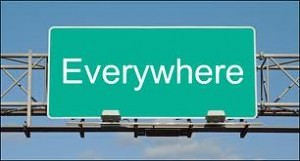It took one sentence to prompt this post – “Why ‘21st Century Statecraft’ – the idea that America can use the Internet to influence global events – is more dream than reality.”
I’m going to write first with my immediate stream of conscious reaction to this powerful statement, and th en I’ll read the article from which I extrapolate – Bloomberg Businessweek, Feb. 7-13, 2011, “Opening Remarks: The Fallacy of Facebook Diplomacy” by Brendan Greeley.
en I’ll read the article from which I extrapolate – Bloomberg Businessweek, Feb. 7-13, 2011, “Opening Remarks: The Fallacy of Facebook Diplomacy” by Brendan Greeley.
I am bi-cultural; born in the U.S. of a Persian father and mixed-heritage (German/Irish) Midwestern mother. When I lived in Iran as a kid, the country was on the way to westernization aka freedom. The Shah, weak monarch puppet of the United Kingdom and U.S., was loosening the strict codes and feeding the yen for a democratic monarchy by hordes of students who demonstrated powerfully en masse, and their voices were heard. Educators ruled, and students attended university in droves with the promise to make a better life and get a ticket to the promised land – the U.S.A.
The Empress basically banned the chador, and women wore the latest Parisienne fashion in short skirts, lots of ruby lipstick, eye liner and shadows with heads uncovered to the chagrin of clerics who believed women unequal and inferior to men (still to this day).
We lived a happy life as children in Iran with no television and no telephone. We drove an American Chevrolet which was considered high luxury. We had to hire a housekeeper who essentially taught my baby sister better Farsi than she spoke English.
My mom made us peanut butter from scratch, and we loved her homemade pizza, too (our favorite meal). We used foil and straws to make garland for our pseudo Christmas tree (there were no pines in the desert), and Mom bought ornament kits so we could make our decorations.
The hostage crisis in 1979 and revolution thereafter stole those freedoms – for women to attend university alongside men; for students to demonstrate on streets; for women to choose which attire they wore; and something we all take for granted – handholding. Those events uprooted families throughout the country, and it impacted who I became as an adult.
While attending the University of Wisconsin at Madison, I easily hid my heritage; when asked, my name was of Italian descent.
The most recent elections in Iran a year ago were fueled by social media; the world watched, and the people of Iran took to the Internet buoyed by global support and cheers of encouragement for freedom – all in silence on Facebook, Twitter, YouTube, and elsewhere with people they had yet to and would never meet.
We gave the Iranian people false hope, yet we gave them hope. Then, it was all taken away; the bloodshed a black mark on freedom and the Green Revolution. Now, we watch and add our tweets, posts and remarks of encouragement to Tunisia, Egypt, Yemen, and other developing nations soon to come.
The desire for freedom fueled by social media and Internet ubiquity is palpable when we engage with emotionally charged activists who bravely tweet and Facebook. Those who present their true identity on social media are forever tagged by cyber police.
Until you get a flavor of what’s over the mountain, you live comfortably within your boundaries. I understand.
~
Now, let me read Mr. Greeley’s piece and see what he’s intended for his opening remarks to this week’s issue of Bloomberg Businessweek. I offer these direct extrapolations that give credence to my personal musings:
- “America would take sides by building tools to route around censorship.
- A country that would deprive its citizens of information, the Secretary of State argued, would deprive them of a market advantage.
- The dissident who organizes on Facebook, for example, leaves behind a map for security to follow.
- Facebook is not staffed up to fulfill its new accidental mission.
- The Internet is American in origin and spirit; it is one of the best expressions of what the nation’s economy, and yes, its government can accomplish. America’s instinctive support for the right to speak and assemble can be hard to square with its need for stability. That’s as true online as it is on the street.
- We like to make the world a better place, to mold it in our image.”
~
Read the article; it’s well worth pondering. Think once when you meet a global compatriot on social media whether you’re supporting their cause for freedom with hope and encouragement or stoking the flames for what may not be on the other side of the mountain.
(photo credit: sexysocialmedia.com)








